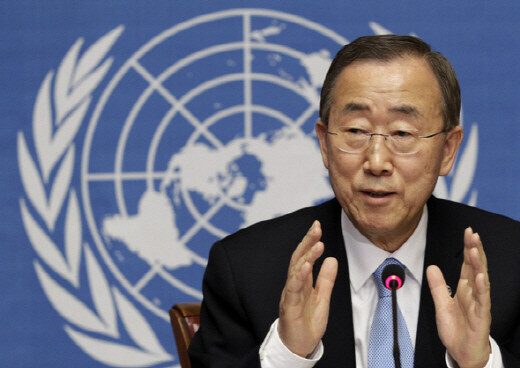hankyoreh
Links to other country sites 다른 나라 사이트 링크
Ban Ki-moon to seek second term

By Kwon Tae-ho, Washington Correspondent
U.N. Secretary General Ban Ki-moon, whose term in office finishes at the end of this year, has set out to be re-elected.
Ban officially announced his intention to fight for re-election on June 6 at U.N. headquarters in New York, at a press conference to explain the outcome of the African Union summit meeting in Addis Ababa and his visits to Nigeria, France and Italy.
Ban is now known to have secured recommendation as a candidate and support from the five permanent members of the UN Security Council including the United States, the United Kingdom, France, China and Russia, which have the right to veto candidates. Ban has no competitors and is therefore expected to win an easy re-election, withstanding any unexpected events. All U.N. secretary-generals have succeeded in being re-elected since the organization was founded in 1945, with the exception of Boutros Boutros-Ghali, who had strong anti-American leanings.
Since taking office, Ban has been criticized over matters including insufficient charisma, being biased toward the United States, and being too passive regarding human rights abuses in powerful countries such as China and Russia. Last year, whistle blowing site WikiLeaks made public a diplomatic cable from 2006 in which the then-U.S. ambassador to the Republic of Korea, Alexander Vershbow, reported back to headquarters regarding Ban’s candidature for the position of U.N. secretary-general, that his election would be to the advantage of the United States, and that Ban was innately sympathetic on nearly every issue impacting the United States.
Since the democracy movement that began in North Africa and the Middle East early this year, however, Ban has conveyed a stronger image than before, defending the legitimacy of the protesters from the start while moving swiftly to urge the cessation of armed repression. He called Libyan leader Muammar al-Gaddafi and gave him a strong warning about hard-line repression, visited Egypt and Tunisia in person, and met figures such as Barack Obama and Nicolas Sarkozy, president of France, the chair of NATO, to deliberate over the problem.
This process allowed Ban to naturally secure international leadership and it is reported that the leaders of all states on the U.N. Security Council expressed definite support for his re-election. Even human rights groups that had been critical of Ban have admitted that Ban had been more vocal on human rights violations in countries such as Egypt, Libya and Cote d’Ivoire over the last few months.
Ban has said that, if re-elected, the top priority of his second term will be a treaty on climate change. He has also mentioned that he will further reinforce security, development and human rights, the three values that the U.N. is supposed to pursue. Other issues that remain unresolved include democratization in the Middle East and North Africa, and the situation in Sudan.
The US State Department spokesman Mark Toner said in a press briefing on Monday, “Our position is clear. We welcome his announcement that he will seek a second term as secretary-general.”
Please direct questions or comments to [englishhani@hani.co.kr]
Editorial・opinion
![[Column] Season 2 of special prosecutor probe may be coming to Korea soon [Column] Season 2 of special prosecutor probe may be coming to Korea soon](https://flexible.img.hani.co.kr/flexible/normal/500/300/imgdb/original/2024/0426/3317141030699447.jpg) [Column] Season 2 of special prosecutor probe may be coming to Korea soon
[Column] Season 2 of special prosecutor probe may be coming to Korea soon![[Column] Park Geun-hye déjà vu in Yoon Suk-yeol [Column] Park Geun-hye déjà vu in Yoon Suk-yeol](https://flexible.img.hani.co.kr/flexible/normal/500/300/imgdb/original/2024/0424/651713945113788.jpg) [Column] Park Geun-hye déjà vu in Yoon Suk-yeol
[Column] Park Geun-hye déjà vu in Yoon Suk-yeol- [Editorial] New weight of N. Korea’s nuclear threats makes dialogue all the more urgent
- [Guest essay] The real reason Korea’s new right wants to dub Rhee a founding father
- [Column] ‘Choson’: Is it time we start referring to N. Korea in its own terms?
- [Editorial] Japan’s rewriting of history with Korea has gone too far
- [Column] The president’s questionable capacity for dialogue
- [Column] Are chaebol firms just pizza pies for families to divvy up as they please?
- [Column] Has Korea, too, crossed the Rubicon on China?
- [Correspondent’s column] In Japan’s alliance with US, echoes of its past alliances with UK
Most viewed articles
- 1‘We must say no’: Seoul defense chief on Korean, USFK involvement in hypothetical Taiwan crisis
- 2[Column] Season 2 of special prosecutor probe may be coming to Korea soon
- 3N. Korean delegation’s trip to Iran shows how Pyongyang is leveraging ties with Moscow
- 4Korea sees more deaths than births for 52nd consecutive month in February
- 5Amnesty notes ‘erosion’ of freedom of expression in Korea in annual human rights report
- 6[Reportage] On US campuses, student risk arrest as they call for divestment from Israel
- 7[Editorial] New weight of N. Korea’s nuclear threats makes dialogue all the more urgent
- 8‘Weddingflation’ breaks the bank for Korean couples-to-be
- 9[Column] Has Korea, too, crossed the Rubicon on China?
- 10[Column] Park Geun-hye déjà vu in Yoon Suk-yeol